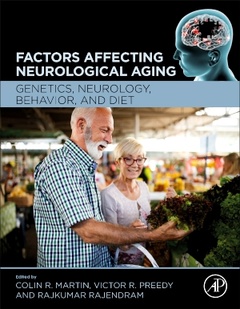Description
Factors Affecting Neurological Aging
Genetics, Neurology, Behavior, and Diet
Coordinators: R Martin Colin, Preedy Victor R, Rajendram Rajkumar
Language: English
Subjects for Factors Affecting Neurological Aging:
686 p. · 21.4x27.6 cm · Hardback
Description
/li>Contents
/li>Biography
/li>Comment
/li>
Factors Affecting Neurological Aging: Genetics, Neurology, Behavior, and Diet is a comprehensive reference on the genetic and behavioral features associated with neurological aging and associated disorders. This book discusses the mechanisms underlying neurological aging and provides readers with a detailed introduction to the aging of neural connections and complexities in biological circuitries, as well as the physiological, behavioral, molecular, and cellular features of neurological aging. Finally, this comprehensive resource examines the use of animal modeling of aging and neurological disease.
I. Genetics, Molecular and Cellular Biology1. Genetics of frontotemporal dementia2. Aging, brain-derived neurotrophic factor (BDNF) and its polymorphism3. Aging, demented patients, and polymorphisms in cytokine genes4. RNA fragments and brain aging5. Centrosome functions and remodeling during neuronal development and centrosome abnormalities in neuronal disorders, disease, and in aging6. Brain aging and microarray analysis7. Human nuclear tau and aging8. Lipoxidation: features, neurological tissues and aging9. Aging and brain amino acids10. How 3’,5’-cyclic nucleotide phosphodiesterases change in the brain with normal aging and dementia11. The prohibitin complex in aging and neurodegeneration12. Synaptic ATPase and energy metabolism in the nervous system: roles and changes in the aging process
II. Neurological and Imaging Features13. Microstructural Imaging of the Human Brain with Normal and "Abnormal" Aging using Diffusion Magnetic Resonance Imaging14. Imaging the brain and its vascular in aging: Applications of optical coherence tomography angiography15. Potential involvement of perineuronal nets in brain aging: an anatomical point of view16. Grey-matter networks in aging17. Brain synapse-related proteins what they do and how they change in aging18. Macro- and chaperone-mediated autophagy in aging19. Neuronal L-type calcium channels in aging20. D-serine-regulated glutamatergic transmission and microglia: impact of aging21. Voltage-gated potassium channels and the aging brain22. Dendritic spine remodeling and aging23. High-density lipoprotein-cholesterol and neuroaging: memory, gyrification of the insular and frontal opercular cortex24. Astrocyte and microglial aging: morphology and modelling25. Neural scaffolding: features, profiles and the aging cerebellum26. BACE1 RNAi, memory and aging27. Aging, myelination and the optic nerve28. Linking proteostasis, brain aging, and ischemia29. Luteinizing hormone and the aging nervous system30. Insights into aging using transcranial magnetic stimulation31. Alpha rhythms: what they are and how they alter with aging32. Nicotine and its derivatives in healthy brain aging
III. Physiological Aspects33. Environmental enrichment and physiological aging34. Treadmill exercise and neuroinflammation: links with aging35. Impact of aerobic exercise on brain structure in models of aging: hippocampus and beyond36. The physiology of fitness and the brain in aging37. Aging, Babble Noise and the processing of speech perception38. The blood-brain barrier in aging
IV. Behavior And Psychopathological Aspects39. Linking aging, anticholinergic drug use, and cognitive impairment40. Cognitive Frailty: Definition, components and impact on disability, and mortality41. The physiology of the "Brain-muscle loop" in aging42. Disentangling the effects of aging and ovarian hormone loss on sleep: Implications for health and disease43. Role of DNA methylation in aging-related cognitive functioning'44. Depression in the elderly and psychobiotics
V. Diet And Nutrition45. Aging, dietary patterns and cognition46. Geriatric nutritional risk index: Application, and limitations47. Diet, inflammatory biomarkers, and brain aging48. DASH diet and brain aging49. The ketogenic diet and healthy brain aging50. Autophagy and aging: diet, exercise, and the link with the target of rapamycin complex 1 (TORC)51. Dietary Flavonoids and Brain Health in Ageing: food for Thought52. Antioxidant effects of curcumin and neuroaging53. Lipoic acid and vitamin D3 and their use in preventing brain aging54. Aging and working memory: Impact of the leucine metabolite beta hydroxy-beta-methyl butyrate55. Hydration, the brain and aging
- Provides the most comprehensive coverage on a broad range of topics related to the neuroscience of aging
- Features sections on the genetic components that influence aging and diseases of aging
- Focuses on neurological diseases and conditions linked to aging, environmental factors and clinical recommendations
- Includes more than 500 illustrations and tables




